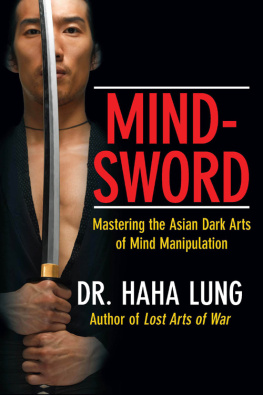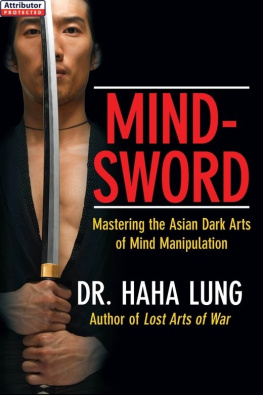CONCLUSION:
How to Win by Failing
W E TOAST WHAT COMFORT we enjoy today with wine viciously stomped from the grapes of wrath our victorious forefathersbe they beasts, badmen, or Buddhasplanted over the fresh graves of enemies less fleet of foot, less tactical of thought, enemies less-prepared when our forefathers foresight and patient understanding of the past overran their enemies paltry present on our forefathers headlong charge toward a focused future those indolent enemies had already proven themselves unworthy to occupy!
Thus, we must refrain from judging too quickly, too harshly our forefathers hard eye and heavy hand, lest the future use our own inflexible template to one day indict us just as harshly.
Often the truth and impact of a mans deeds are not fully revealed let alone recognized until time and distance allows for a fuller, more objective view, after all subjective wounds are healed (or at least bound up tightly), all bridges once put to the torch, rebuilt.
Without this luxury of time and distance, the line between success and failure always seems more clear than it really is.
For example, at first glance we might see only failure when hearing that:
Hannibal died a suicide.
Spartacus was killed in battle, his body never found.
Yoritomo, despite all his accomplishments, died mundanely after a fall from his horse.
Vlad Tepes was dethroned more than once, imprisoned, and finally assassinated ... only to be further defamed, doomed to endlessly walk the earthat least in fictionas the demon Dracula.
Yes, has it not been said Experience is what you get when you dont get what you wanted?
Sometimes we really do win by failing.
To win by failing sounds a bit Orwellian. Yet, curiously, our modern English word failure comes to us from the Latin fallere , meaning to deceive.
That some men might win fortune and fame by deceiving shouldnt come as any surprise.
In war, deception is strategy .
In commerce, financial savvy and insight .
In the bedroom, seduction .
So far as Hannibal, Spartacus, Yoritomo, and Vlad Tepes are concerned, perhaps their greatest success was in failure, i.e., deception, deceiving their enemies into thinking theyd heard the last of them. Its called legacy :
Hannibal built the Roman Empire by giving the Romans an enemy they had to scramble to stay ahead of and struggle to defeat.
Spartacus then not only shook that empire, his slave revolt became the inspiration for future slave revolts, and for social revolutions up to our modern day.
Shogun Yoritomos iron hand and steel will set the standard for the Samurai ideal that would rule Japan for the next 1,000 years.
Vlad Tepes held the lineoften aloneagainst the invading Saracen horde, sparing European civilization from Islamization.
Given these examples, perhaps we would do better teaching our children to reach for failure than for success.
Perhaps we should wish departing soldiers a hearty Failure! than wish them Victory!
More realistically, we find a simple Taoist yin-yang meaning here: Within any plan for successno matter how many times we dot the Is, cross the Ts, there still exists the potential for failure ... demanding we remain ever alert!
Conversely, no matter how abysmal appears our failureor the failure of the Universe to recognize and reward our genius!still, within that compacted compost of failure resides the seeds of success.
Let us not fail to become better gardeners.
SOURCES AND SUGGESTED READING
Bhagavad-gita (The Song of God) (miscellaneous translations).
Baughman, Robert D., and Black, C. B. 666 Devilish Secrets of Islam. (OH: Only Publications, 2010).
De Beer, Sir Gauin. Hannibal: Challenging Romes Supremacy . (NY: A Studio Book/The Viking Press, 1969).
Brandon, S. G. F. Ancient Empires (Milestones in History). (NY: Readers Digest Assn. Ltd. Newsweek Books. 2nd ed., 1973).
Chandler, David, ed. A Dictionary of Battles . (NY: Henry Holt & Co., 1987).
Clark, Jane. In the Shadow of Dracula. ( USA Today , 10.29.2010:5D).
Deacon, Richard. A History of the British Secret Service. (London, 1969).
Dhammapada (Sayings of The Buddha) . (miscellaneous translations.
Florescu, Radu, R., and McNally, Raymond T. Dracula: Prince of Many Faces. (Back Bay Books, 1989).
Greaves, Richard L., et al. Civilizations of the World. (Harper Collins College Pub. 2nd ed. 1993).
Krippendorff, Kaihan. Hide a Dagger Behind a Smile. (Adams Media, 2008).
Lamb, Harold. Hannibal: One Man Against Rome. (NY: Doubleday & Co., Inc., 1958).
Ledeen, Michael A. Machiavelli on Modern Leadership. (Truman Talley Books/St. Martins, 1995).
Livy . (English translation by B. D. Foster. 1st printing, 1929).
Lowell, Thomas. The Vital Spark: 101 Outstanding Lives. (NY: Doubleday & Co., Inc., 1959).
Lung, Haha. The Ancient Art of Strangulation. (CD: Paladin Press, 1995).
. Ninja Craft . (DH: Alpha Publications, 1997).
. Assassin! Secrets of the Cult of the Assassins. (Paladin Press, 1997).
. Knights of Darkness. (Paladin Press, 1998).
. Cao Dai Kung-fu. (WA: Loompanics Unlimited, 2002).
. Assassin! (NY: Citadel Press, 2006).
. Lost Fighting Arts of Vietnam. (Citadel Press, 2006).
. Mind Control. (Citadel, 2006).
. Mind Penetration. (Citadel, 2007).
. Mind Fist. (Citadel, 2008).
. The 99 Truths: Hannibals Black Art of War. (publication pending).
and Prowant, Christopher B. Black Science. (Paladin Press, 2001).
. Shadowhand: Secrets of Ninja Taisavski. (Paladin Press, 2002).
. Mind Manipulation. (Citadel, 2002).
. Theatre of Hell: Dr. Lungs Complete Guide to Torture. (Loompanics Unlimited, 2003).
. Ninja Shadowhand: The Art of Invisibility. (Citadel, 2004).
. Mental Dominance. (Citadel, 2009).
. Mind Assassins. (Citadel, 2010).
. Mind Warrior. (Citadel, 2010).
Lung, Haha, and Tucker, Eric. Nine Halls of Death. (Citadel, 2007).
Machiavelli, Niccol. The Discourses. (trans. Leslie J. Walker, 1929).
. The Prince (1513).
Mahabharata. (miscellaneous translations).
Mao Tze-Tung. On Guerrilla Warfare. (miscellaneous translations).
Matthews, Robert. Age of the Gladiators. (2004).
Marr, Gerald. Japanese Women, Ancient and Modern. ( Transactions and Proceedings of the Japanese Society , 1920).
Miyamoto Musashi. Go Rin No Sho (A Book of Five Rings). (1645, miscellaneous translations).
Omar, Ralph Dean. Ninja Death Touch: The Fact and the Fiction. ( Black Belt magazine, September 1989).
. Death on Your Doorstep (Alpha Publications, 1995).
Ratti, Oscar, and Westbrook, Adele. Secrets of the Samurai: The Martial Arts of Feudal Japan. (Boston: Tuttle Publishing, 1973).
Sawyer, Ralph D. The Seven Classics of Ancient China. (Basic Books, 1993).
Seth, Ronald. Secret Servants: A History of Japanese Espionage. (NY: Farrar, Straus and Company, 1957).
Skinner, Dirk. Street Ninja: Ancient Secrets for Surviving Todays Mean Streets. (NY:Barricade Books, 1995).
Spencer, Robert. The Politically Incorrect Guide to Islam. (Regnery Publishing, Inc., 2005).
















